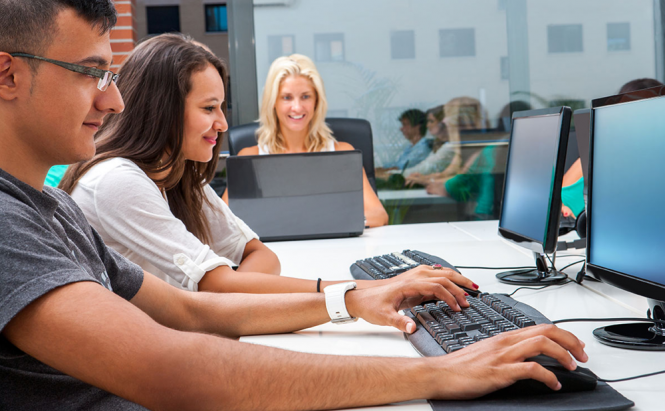Computers are becoming more of a necessity than a commodity, so more and more households have at least one. However, this also means that there are many people who have just got a PC and are now trying to learn how to properly use it. Since everybody has to start somewhere, I've decided to write this article and offer you several helpful tips and tricks that I picked up over the years and that I wish I knew when I first started using a computer.
Multiple partitions
The first thing that you should do is ask the person who's installing your operating system to set up at least two partitions on your hard-disk. I prefer using three, but that's not always the rule. Why do you need multiple partitions? Well, there is going to come a time when you will need to reinstall your Windows and when you do that, you also want to format (wipe) the partition where the operating system was installed. If you only have on partition, this means that you will lose absolutely everything that was stored on the PC. This also brings us to my second advice:
Backup everything that's important
You should always keep copies of the important stuff on a different partition. I, for one, use a secondary partition to store the driver for my motherboard (I can get the rest from the Internet), documents, pictures, downloaded music and important applications. Basically, everything that you can't recreate or things that would take a long time to download are worth keeping safe on a different partition than the one you boot from. Something unexpected can happen, and your Windows can crash at any moment, so it's better to be safe than sorry.
Keep everything up-to-date
The software on your PC should be updated as often as possible. The most important thing to keep up-to-date is your anti-virus or other security tools, the operating system, drivers, Flash, Java and applications that connect to the Internet. So, whenever you see an alert telling you that something needs updating, don't ignore it, as you may be putting your PC at risk. The one exception to this rule are pop-up alerts that appear in your browser: a lot of sites use scare tactics or fake update notifications to get you to install malware, so ask someone with computer experience before installing anything that your web browser recommends. In case there's no one available, ignore any warnings that pop up in your browsers.
Security tools should be installed first
If you're dealing with a fresh operating system, you should install the security software before everything else. In case you're using Windows 10, Windows Defender comes pre-installedб so it's OK if you install something else first, but on every other Windows anti-virus and anti-malware tools should always come first. In case you don't already have an anti-virus that you prefer or that you paid for, read our previous article: "Best Free Antivirus Software of 2015 with Firewalls", as it will help you find at least a temporary solution.
Don't believe everything you see on the Internet
I've already talked a bit about this earlier, but I feel like it's very important. If you spend time on Facebook, Twitter, online newspapers, etc. you are bound to run into a few websites that have some really questionable ads. In order to get you buy a product, visit a certain website or install something, some websites will use scary messages. I've seen a lot of stuff like "Warning, your PC has been infected" or "Malware detected" and even aggressive messages such as "If you ignore this message your battery will explode" or "If you close this page, your computer will be permanently damaged". Never believe such a thing. Your browser or website are never able to detect if your computer has a virus or a hardware problem, so they are simply lying. The only security threat your browser can detect is when you're trying to visit a website that has been reported as malicious. It will warn you about it with a red screen, and since you're a beginner, you would do well to heed that warning.
Your ISP can see when you use Torrent sites
There are many countries where using Torrent sites is against the law. You may hear or read about other people downloading things from Torrents, but if it's against the law in your country, such actions are really easy for the authorities to spot, so in the end, it may be cheaper for you to buy something rather than to resort to piracy.
Constantly perform maintenance tasks
After a while, your computer will start running slower, and that will have both software as well as hardware. This is why it's important to periodically clean your operating system. In case you need some help with this task ,you should check out my previous articles: "How To Properly Maintain Your PC" and "How To Remove Programs Without Affecting Your Operating System". The hardware components should also be cleaned from time to time (at least once every six months), but you should seek some professional help for doing this, at least for the first few times until you get the hang of it.
There you have it, friends: some of the most basic stuff that you should know when starting to use a computer. If you're looking for applications that make things easier for beginners, you should read Helga's article: "Simplified Software for Silver Surfers". In case you want to improve your proficiency with the keyboard, check out Violette's article: "Let's Increase Typing Speed".




